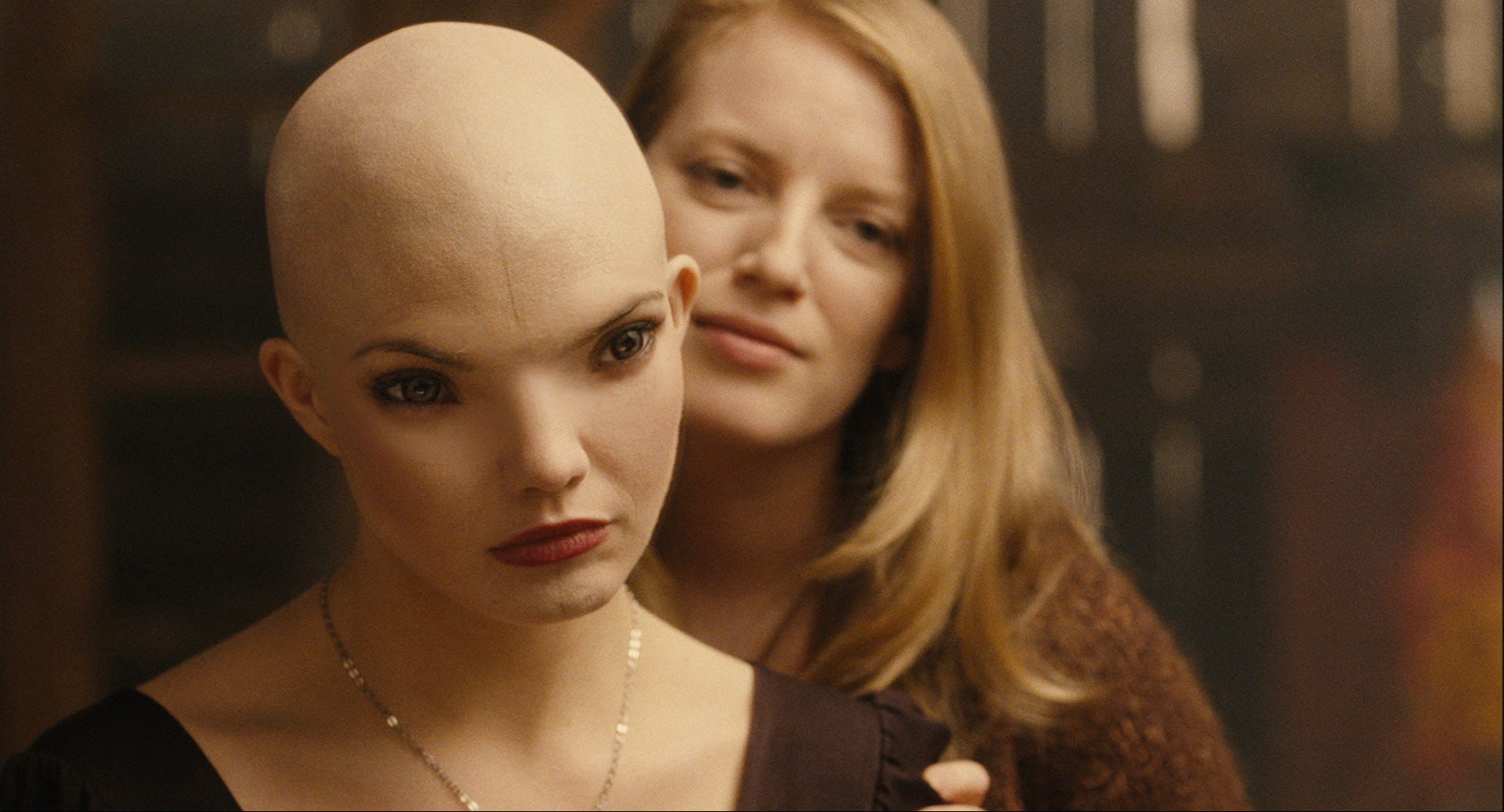Before I launch into the analysis of this wonderful little film, I must take a moment to vehemently state how wrong the Internet Movie Database is in classifying the genre(s) of Splice. As the line between science fiction and fact slowly dissipates with the progression of real world research, we must begin to start taking fantastic ideas like human beings infused with animal DNA with considerably more seriousness.
Heads up, people! Stem cells are only the beginning. Splice is opening the door to a potential world we do not yet know but could very well be the next stage of human evolution. It does this by posing serious questions regarding morality, ethics and the legitimacy of research that could very easily be applied to what is being cooked up in labs at this very instant. Splice contains so few elements of “horror” and “thriller” that to label it as such would demean the entire production. This film represents the creation of the “sci-frama” genre (science fiction + drama). Mark this moment in time, ladies and gentlemen, because this is an area we will see Hollywood explore with much more depth.
As much as the far right criticizes Hollywood for being unapologetically liberal in the vast majority of the films it supplies the world, this is absolutely untrue in regards to the theme of “science: unchecked.” From Terminator (1984) to Gattaca (1997) to Jurassic Park (1993) to Frankenstein (1931), Hollywood has been fairly clear that messing with the powerful force of nature that is life will have dire consequences. This is the very heart of the plot of writer/director Vincenzo Natali’s little film that could. With a budget of only $26 million and featuring an Oscar Award-winning actor in Adrien Brody, this film takes a large step in the right direction to leveling the walls that pigeon-hole science fiction. This film is all about plot and all about solid writing. What makes this film work, while asking the grandiose questions regarding scientific research, is that it revolves around the relationship among three characters: the gene splicing couple Clive (Brody) and Elsa (Sarah Polley) and the creature known as Dren (Delphine Chanéac). The director does well to write in shades of horror and suspense as the creature is birthed and developed, but those scenes never pay off as he fools the audience into being most attentive during the constant ethical debate over what Clive and Elsa are doing.
Although the looming presence of a corporate sponsor hounds the scientists throughout, it is the relationship between the couple where the true conflict unfolds. There is some scientific jargon to muddle through, but both Elsa and Clive address each other and their predicament with true, blue collar grit. Another theme that Vincenzo Natali develops is the responsibility of a parent and the ever-changing role it assumes. This couple has no children of their own and struggle immensely with just about every interaction with Dren to the point that one could feel the moans of experience from all parents present in the audience. There’s even a strong element of the avant-garde as this film oozes with the reverse Oedipus complex. Suffice it to say that this leads to perhaps the most interesting scene in the film and completely sends the couple down the road of no return.
This film’s use of CG effects is limited to wide/action shots of Dren. Although the creature adequately displays a physical superiority over the average human, I remind the reader of the $26 million budget, so do not expect Matrix-type acrobatics. As a result, this film does not contain a visual style one would expect from modern day science fiction. But it is because this film is shot more like a drama, featuring fixed camera shots, pans and tracks that it reveals its true distinction as something unique. Another truly impressive technical aspect of Splice is the collaboration between the CG, costume and make-up departments that conceived the deceptively seductive look of the creature, Dren. It is the sort of breakthrough that would’ve made Stan Winston proud. Although this film could have used a few more action sequences to break up some of the very heavy dialogue scenes, the editing techniques were smooth as silk as there were no awkward transitions despite rather drastic changes in venues.
Perhaps there is an unwritten rule for Hollywood actors appearing in sci-fi films that permits them to “mail in” their performances (see: the entire cast of the Star Wars prequels sans Ewan McGregor), but Splice, being the trendsetter that it is, ignores this rule. Love him or hate him, Adrien Brody does have significant acting chops and this is the type of film that would have most A-listers heading for the hills. I respect his decision to take a risk by assuming this role, despite the fact that he was called to, once again, display the conflicted weakling. In all fairness, he sells his role quite well because just about every scene finds him at the short end of the stick and I genuinely felt bad for him. Towards the end of the film, Brody unveils moments of vulnerability and intimacy with Dren, the same kind of raw emotion that bagged him Oscar gold in 2003.
Sarah Polley’s success from the Dawn of the Dead (2004) remake can be seen as a double-edged sword because she has established a keen ability to portray the “woman in charge.” This doesn’t change for her role in Splice, but it is the chemistry she develops with Brody that softens her character just enough for the audience to sympathize. This sympathy develops less from their romantic interludes and more from the comedic moments they share as blundering “parents” to a new species. And speaking of the new species, Delphine Chanéac’s portrayal of Dren involves a complex mix of childish innocence to sultry seductress to ravenous beast. I know, I know, whoever gets to be “the monster” in any given film has a costume and make-up advantage over the other actors that allows him or her to more fully become that character, but not every actor takes advantage of this (see: Schwarzenegger in anything). Chanéac’s performance is fueled almost exclusively by pantomime as her character does not speak, but still manages to nail every aspect of her character’s developmental behaviors.
Spliceis a Grade-A recommendation, but it will not see huge box office return for three reasons: 1) Not a large budget, 2) Will not scare the pants off anyone, and 3) Most American audiences do not like to be pestered by thought while watching any summer films. Make no mistake: this film gets the creative juices flowing and unless the individual is ready to engage both the content and context of this film, that person will not find this entertaining. Those of you seeking slightly more summer substance will be rewarded.
The climax of Splice is neither surprising nor satisfying (usually the kiss of death for any film) but as it comes rather swiftly, the scene comes off like an afterthought and is therefore forgivable. Perhaps Natali simply ran out of steam by the end of this production to make the third act as epic as the first two. It would have been nice to really see all hell break loose the way the entire film seems to set the audience up for. Instead, only a little hell breaks loose and we are enticed with, dare I say, a sequel?







